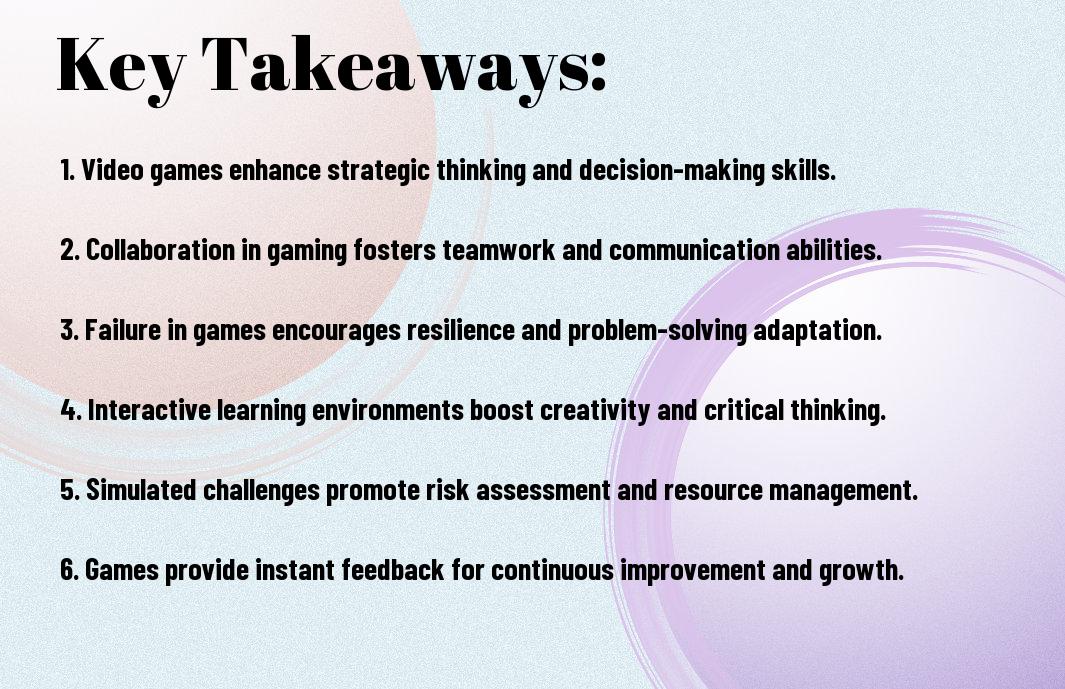As you navigate the complexities of everyday life, you’re constantly faced with problems that require creative solutions. Your ability to think critically and approach challenges from unique angles is vital. Interestingly, video games can be a valuable resource in developing these skills, offering immersive environments where you can experiment, take risks, and learn from your mistakes, ultimately enhancing your real-world problem-solving abilities.

Key Takeaways:
- Video games offer a unique platform for developing problem-solving skills, as players are often presented with complex challenges that require creative and critical thinking to overcome.
- Games can teach us to approach problems from different angles, experimenting with various solutions and learning from failure, which is an necessary aspect of real-world problem solving.
- The interactive nature of video games allows players to receive immediate feedback on their actions, helping to refine their decision-making skills and adapt to new situations.
- Many video games encourage collaboration and teamwork, promoting communication, cooperation, and mutual support, all of which are valuable skills in real-world problem solving.
- Video games can also foster a growth mindset, as players are often encouraged to take risks, try new approaches, and view failures as opportunities for growth and learning.
- The immersive and engaging nature of video games can help to build motivation and persistence, as players become invested in solving problems and achieving goals within the game world.
- By analyzing the problem-solving strategies and techniques used in video games, we can gain insights into how to apply these skills to real-world problems, leading to more effective and innovative solutions.
Game Design Principles in Problem-Solving
A key aspect of video games is their ability to teach you valuable skills that can be applied to real-world problem-solving. By analyzing game design principles, you can gain a deeper understanding of how to approach complex problems in a logical and methodical way.
Strategic Thinking and Resource Management
With the right mindset, you can develop strategic thinking and resource management skills, allowing you to prioritize tasks and allocate resources effectively. This enables you to tackle problems in a more efficient and organized manner, much like you would in a game.
Risk Assessment and Decision Making
Risking it all can be a valuable learning experience, as you weigh the potential outcomes of your decisions and adjust your strategy accordingly. In games, you learn to assess risks and make informed decisions, a skill that translates well to real-life problem-solving.
Another important aspect of risk assessment and decision making is considering the potential consequences of your actions. As you play games, you develop the ability to think critically about the potential outcomes of your decisions, allowing you to make more informed choices in your personal and professional life, and helping you to develop a more nuanced understanding of your own decision-making process, which you can apply to your own problem-solving strategies.

Learning Through Failure
It is in video games that you experience failure as a natural part of the learning process, allowing you to learn and improve from your mistakes without significant consequences.
Safe Environment for Experimentation
Any attempt to solve a problem in a video game provides you with a safe space to try out different approaches, helping you to develop your critical thinking skills and build confidence in your ability to tackle challenges.
Iterative Problem-Solving Approaches
ProblemSolving in video games often involves trying different solutions, analyzing what works and what doesn’t, and adjusting your approach accordingly, teaching you to be patient and persistent in the face of obstacles.
But as you apply these iterative problem-solving approaches to real-world challenges, you will find that your ability to analyze problems, identify patterns, and adapt to new information will significantly improve, enabling you to tackle complex issues with a logical and methodical mindset, and ultimately, achieve your goals more effectively.
Collaborative Problem-Solving
Despite the common perception that video games are a solo activity, many games require collaboration to solve complex problems, teaching you valuable skills that can be applied to real-world situations.
Team Dynamics in Gaming
Problematically, you may struggle to work with others, but video games can help you develop vital team dynamics, such as trust, leadership, and mutual support, allowing you to tackle challenges more effectively.
Communication and Coordination Skills
Against the odds, you can develop strong communication and coordination skills by playing video games, learning to work together with your teammates to achieve a common goal, and adapting to different roles and responsibilities.
Communication is key to successful collaborative problem-solving, and video games can help you develop your ability to convey your thoughts and ideas effectively, as you learn to articulate your plans and strategies to your teammates, and adjust your approach based on their feedback, allowing you to work together seamlessly and achieve your objectives.
Adaptability and Pattern Recognition
Not all problems can be solved with a fixed approach, and video games teach you to adapt to new situations and recognize patterns to overcome challenges.
Dynamic Problem Environments
Following your progress through a game, you encounter diverse environments that test your ability to adjust strategies and think critically, preparing you for real-world complexities.
Skill Transfer to Real Situations
Along with the skills you develop, you can apply them to your everyday life, as your enhanced adaptability and pattern recognition abilities enable you to tackle problems from unique angles.
Problem solving in video games helps you develop a mindset that allows you to analyze situations, identify patterns, and apply your knowledge to your real-life challenges, enabling you to make informed decisions and find innovative solutions to the problems you face, and as you continue to play, you refine your skills, becoming more adept at transferring your gaming experience to your everyday life, making you a more effective problem solver.
Motivation and Engagement
For many of you, video games offer a unique blend of motivation and engagement, driving you to invest hours in solving problems and overcoming challenges. You find yourself drawn into the game’s world, eager to progress and achieve your goals.
Goal-Setting and Achievement Systems
After setting clear objectives, you’re more likely to stay motivated and focused, as seen in video games with well-designed achievement systems, guiding you toward specific targets and tracking your progress.
Progress Tracking and Feedback Loops
Loops of feedback and assessment help you adjust your strategy, as you encounter obstacles and learn from your mistakes, refining your approach to ultimately succeed.
And as you track your progress, you begin to see patterns and areas for improvement, allowing you to make data-driven decisions to optimize your performance, much like how video games provide you with detailed statistics and analysis to enhance your gameplay experience, enabling you to refine your skills and achieve your objectives more efficiently.
Real-World Applications
Your problem-solving skills can be applied to various aspects of life, and video games can teach you valuable lessons, as discussed in The Power of Play: How Video Games Enhance Problem Solving Skills, making you a more effective problem solver.
Educational Integration
With the rise of gamification, you can expect to see more video games being used in educational settings to teach complex concepts and promote interactive learning, making your learning experience more engaging and fun.
Professional Training Methods
For instance, you can use video games to develop your skills in a simulated environment, allowing you to practice and learn from your mistakes without real-world consequences, which can be beneficial for your professional growth.
Also, you can explore various professional training methods that incorporate video games, such as simulation-based training, which can help you develop your decision-making and problem-solving skills in a realistic and immersive environment, preparing you for real-world challenges.
Summing up
From above, you can see that video games offer valuable lessons in real-world problem solving. As you apply these skills, you’ll improve your ability to analyze situations, think critically, and make informed decisions. By embracing the problem-solving strategies you’ve learned from video games, you can enhance your approach to tackling complex challenges in your own life, leading to greater success and personal growth, and enabling you to overcome obstacles more effectively.
FAQ
Q: What can video games teach us about real-world problem solving?
A: Video games can teach us a variety of skills that are applicable to real-world problem solving, such as critical thinking, decision making, and analytical skills. Many video games present players with complex problems that require creative solutions, which can help improve cognitive flexibility and adaptability. Additionally, video games often involve working with others to achieve a common goal, promoting teamwork and communication skills.
Q: How do video games encourage players to think creatively and develop innovative solutions?
A: Video games often provide players with open-ended challenges and sandbox environments that encourage experimentation and exploration. This freedom to try new approaches and learn from failure can foster a mindset of creativity and innovation. Furthermore, many games incorporate mechanics that reward players for thinking outside the box and finding novel solutions to problems, such as puzzle games that require unconventional thinking to progress. By embracing this type of gameplay, players can develop their ability to generate and evaluate new ideas.
Q: Can the skills learned from video games be applied to real-world problems, such as those in education, business, or healthcare?
A: Yes, the skills learned from video games can be applied to a wide range of real-world problems. For example, the problem-solving skills developed through playing video games can be used to tackle complex challenges in fields like education, where teachers can use game-based learning to engage students and promote deeper understanding of subject matter. In business, the teamwork and communication skills developed through multiplayer games can be applied to collaborative projects and team management. In healthcare, the analytical skills developed through playing games can be used to analyze data and develop more effective treatment plans. By leveraging the skills learned from video games, individuals can become more effective problem solvers in their personal and professional lives.



